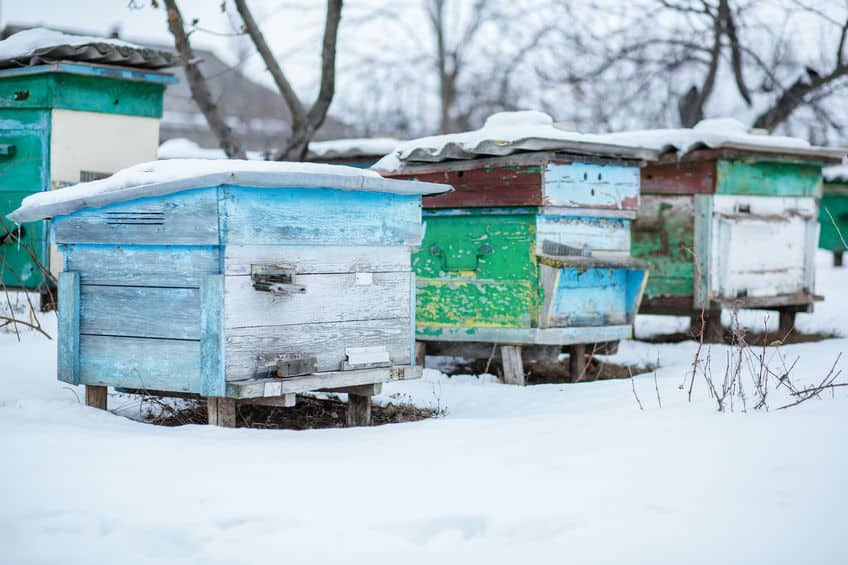When the temperatures start to get cold and the threat of winter creeps up, honey bees will retreat into their hives and live off their honey stores until spring arrives. They must huddle for warmth and vibrate to create heat. Other bees, especially solitary bees, will simply curl up for a long nap, ready to emerge once the temperatures are warm enough again.
Why do bees hibernate?
Insects are cold-blooded creatures. Unlike most animals, they rely on outside temperatures or vibrating to create heat in order to stay warm. When winter hits, bees generally do not make food stores to pass them over until spring and vibrating to make heat uses up a lot of energy. Honey bees have evolved specifically so that they can live throughout the winter on the honey they make, making them a unique exception in the world of bees. For most other bees, it makes more sense to simply eat as much as they can before winter, and then hibernate throughout the cold season.

How do bees hibernate?
Hibernation occurs in a few different ways, depending on the species of bee. For bumblebees, only the new queens will hibernate; the workers and drones will die before or around wintertime. The young queen mates eat up the stores of pollen and nectar, digs herself a burrow in the ground, and then sleep. She will begin the process of building a nest and laying eggs once she emerges in spring.
Mason bees, on the other hand, will die before winter. The eggs laid by the solitary mother bee grow into larvae consume the pollen ball she leaves for them, and then spin a waterproof cocoon around themselves to pupate in. They will hibernate within the cocoon until the temperatures reach around 13°C (55°F), at which point it is warm enough for them to fly and seek out food and mates, beginning the cycle anew.
Yet another species, the carpenter bee, has a unique life cycle. After pupating into adults in late summer, males and females will spend the remainder of the year seeking pollen, and then both will hibernate throughout the winter. When spring emerges, they will mate, the male will die, and the female will continue on collecting pollen and laying eggs for her young to continue the cycle. Female carpenter bees have been known to live for two winters, but it is not common and she will usually die once her youth have hatched.
Do all bees hibernate?
Bees are known to either hibernate or overwinter. For honey bees, retaining heat to keep their queen and the brood warm is vital, so sleeping isn’t an option. Overwintering can be a real challenge for beekeepers, especially in harsh climates. If the disease is in the hive, they are even less likely to survive the winter.
Solitary bees that are endemic to tropical zones generally don’t hibernate; it never gets cold enough to do so, and food is available all year round. That said, bees in regions closer to the poles will hibernate in one form or another, whether it be the pupae spinning cocoons or the mother bees sealing their young in chambers to protect them from the cold.
Do any bees migrate?
Although many insects are known to migrate, including species of butterflies, dragonflies, and grasshoppers, bees do not. Their wings are too small to carry them such large distances. Additionally, bees are accustomed to a specific lifestyle; forage for food, lay eggs and die. The act of migration would disrupt this and would provide little benefit to the bee and its short lifespan.
